| Article Index |
|---|
| Start |
| Previous editions |
| Our Sponsors |
| Speakers |
| Honorary Patrons |

How will Market Stability Reserve (MSR) influence the market?
The CO2 market in Europe needs MSR – European Commission representative argues. The representatives of industry believe on the other hand that MST will disrupt the market. MSR was the hottest topic of the 3rd edition of the conference "Emission Trading Summit", which took place on 19 November 2014 r. organized by CBE Polska.
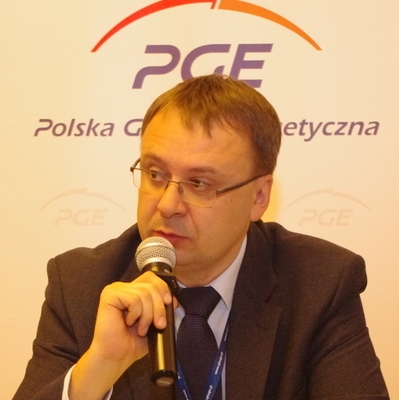 The problem of the EU ETS is primarily an excessive surplus allowances from the second period of operation - said Paweł Mzyk, Deputy Head of the National Centre for Emission Balancing and Ordinance (KOBiZE). The expert reminded that the important assumption of MSR is the specific thresholds of surplus allowances on the market, which are to be withdrawn to the reserve or released from the reserve. The surplus of allowances on the market is so large that it probably will function until 2030. If the surplus of allowances will be greater than 833 million allowances, than 12% will be transferred to the reserve, if it falls below the 400 million allowances, than 100 million allowances will be released from the reserve. In other words, the pool of allowances in the auction decreases or increases, but does not affect the free allowances for industry nor for the free permissions for the Power generation. It is worth noting that there appeared an idea (not without controversy) to delay MSR mechanism until 2017.
The problem of the EU ETS is primarily an excessive surplus allowances from the second period of operation - said Paweł Mzyk, Deputy Head of the National Centre for Emission Balancing and Ordinance (KOBiZE). The expert reminded that the important assumption of MSR is the specific thresholds of surplus allowances on the market, which are to be withdrawn to the reserve or released from the reserve. The surplus of allowances on the market is so large that it probably will function until 2030. If the surplus of allowances will be greater than 833 million allowances, than 12% will be transferred to the reserve, if it falls below the 400 million allowances, than 100 million allowances will be released from the reserve. In other words, the pool of allowances in the auction decreases or increases, but does not affect the free allowances for industry nor for the free permissions for the Power generation. It is worth noting that there appeared an idea (not without controversy) to delay MSR mechanism until 2017.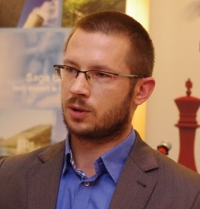 At this point, the work on the MSR after the October conclusions have been intensified. Ministry of Environment is of the opinion that this is another intervention in the system, which currently does not seem necessary. In 2011, we talked about the necessity of earlier auctions to meet hedging needs and to smoothly move from the second to the third period of EU ETS, when shortages of emission rights were forecasted. Later, there was a discussion about back-loading which went in a completely different way, because then there was a surplus of emission rights on the market. According to the European Commission and several Member States, it was necessary to withdraw allowances from the market.
At this point, the work on the MSR after the October conclusions have been intensified. Ministry of Environment is of the opinion that this is another intervention in the system, which currently does not seem necessary. In 2011, we talked about the necessity of earlier auctions to meet hedging needs and to smoothly move from the second to the third period of EU ETS, when shortages of emission rights were forecasted. Later, there was a discussion about back-loading which went in a completely different way, because then there was a surplus of emission rights on the market. According to the European Commission and several Member States, it was necessary to withdraw allowances from the market. The Ministry of Environment believes that any changes should be introduced only from the new financial period, and not in 2017 - said Paweł Rożycki, Head of the Department. Management of Greenhouse Gas Emissions in Air Protection Department of the Ministry of the Environment.
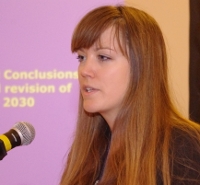 A representative of the General Directorate for Climate at the European Commission, Polona Gregorin announced that the European Commission is opened to ideas of early introduction of MSR mechanism, if that will be the decision of the European Council’s and the European Parliament, and the Commission is not pushing to Market Stability Reserve mechanism to be introduced from 2017. The European Commission representative announced that the vote will be held on February 24, 2015. According to expert, the reform of the EU ETS mechanism is necessary.
A representative of the General Directorate for Climate at the European Commission, Polona Gregorin announced that the European Commission is opened to ideas of early introduction of MSR mechanism, if that will be the decision of the European Council’s and the European Parliament, and the Commission is not pushing to Market Stability Reserve mechanism to be introduced from 2017. The European Commission representative announced that the vote will be held on February 24, 2015. According to expert, the reform of the EU ETS mechanism is necessary.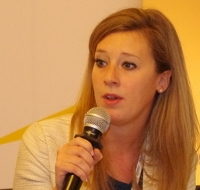 According to Sarah Deblock, Director, Policy of the EU in the IETA (International Emission Trading Association) agreement reached on October 24 this year is very important because the reduction of individual ambitions of Member States will have impact on all changes until 2030. If there will be support for the early introduction of MSR, there is no point to delay it, even though there might be some concerns, especially carbon leakage. Industry representatives fear that after 2020 there will be no proposal that ensures effective protection against the phenomenon of carbon leakage. The imbalance stems from the fact that on one hand we have a legislative proposal on MSR - discussions in Parliament and in the Council are already in progress, but on the other hand there are political commitments, under which free allowances will remain in force until 2020.
According to Sarah Deblock, Director, Policy of the EU in the IETA (International Emission Trading Association) agreement reached on October 24 this year is very important because the reduction of individual ambitions of Member States will have impact on all changes until 2030. If there will be support for the early introduction of MSR, there is no point to delay it, even though there might be some concerns, especially carbon leakage. Industry representatives fear that after 2020 there will be no proposal that ensures effective protection against the phenomenon of carbon leakage. The imbalance stems from the fact that on one hand we have a legislative proposal on MSR - discussions in Parliament and in the Council are already in progress, but on the other hand there are political commitments, under which free allowances will remain in force until 2020.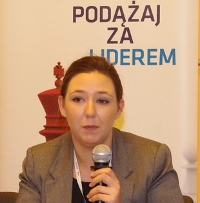 France supports the early introduction of market stabilization reserve as well as the introduction of back-load allowances in the reserve - announced Cécile Goubet, Policy Office EU ETS in the General Directorate of Energy and Climate at the French Ministry of Ecology, Sustainable Development and Energy. The decisions are difficult, but the aim of the structural reform is to promoting new low carbon technologies. The cost of emissions will be affected upwards or downwards by the situation in the politics. We have to make sure that the cost will be properly centered. The price of emissions depends on various factors such as the economic crisis, proposed regulations, new information on the market, etc. Goubet also noted that without achieving the objective in 2030 the system will loose its credibility. Structural reform of the EU ETS must result in getting rid of the emissions allowances surplus, which is currently on the market, and will affect other political activities. When we meet with people working on structural reform, we come to the conclusion that the creation of MSR may shock the market – it is created faster than we can accept. There is a need to strike a balance, so the situation needs to be monitored.
France supports the early introduction of market stabilization reserve as well as the introduction of back-load allowances in the reserve - announced Cécile Goubet, Policy Office EU ETS in the General Directorate of Energy and Climate at the French Ministry of Ecology, Sustainable Development and Energy. The decisions are difficult, but the aim of the structural reform is to promoting new low carbon technologies. The cost of emissions will be affected upwards or downwards by the situation in the politics. We have to make sure that the cost will be properly centered. The price of emissions depends on various factors such as the economic crisis, proposed regulations, new information on the market, etc. Goubet also noted that without achieving the objective in 2030 the system will loose its credibility. Structural reform of the EU ETS must result in getting rid of the emissions allowances surplus, which is currently on the market, and will affect other political activities. When we meet with people working on structural reform, we come to the conclusion that the creation of MSR may shock the market – it is created faster than we can accept. There is a need to strike a balance, so the situation needs to be monitored.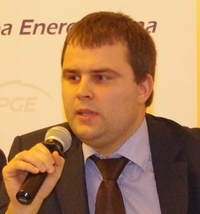 Piotr Zaremba from the Innovation and Industry Department, Sustainable Development and Low-emmission Economy Unit in the Ministry of Economy stated that the planned intervention in the form of MSR will be incompatible with the idea of the EU ETS. When we agreed to the European Emissions Trading System, it was supposed to be a system that would achieve emissions reduction at the lowest cost. The cost for our economy and our energy-intensive companies was high regardless, but it had to be at the lowest possible cost. The current administrative activities begin to push the price up, price that was supposed to be shaped by supply and demand mechanism. Discussed direction will cause the cost to our industry to be greater. The second problem is that we are not sure what we are agreeing to. We are not sure how intervention in the form of MSR will affect the price of allowances. There is no such study, that would convincingly show how price changes, therefore we are forced to decide on a very difficult economic decision, without knowing its outcome. We are in a political context of this discussion and on one hand, when we cannot hide our lack of thrill with MSR proposal, on the other hand we cannot fail to notice that a large proportion of Member States seek to adopt measures implementing this proposal.
Piotr Zaremba from the Innovation and Industry Department, Sustainable Development and Low-emmission Economy Unit in the Ministry of Economy stated that the planned intervention in the form of MSR will be incompatible with the idea of the EU ETS. When we agreed to the European Emissions Trading System, it was supposed to be a system that would achieve emissions reduction at the lowest cost. The cost for our economy and our energy-intensive companies was high regardless, but it had to be at the lowest possible cost. The current administrative activities begin to push the price up, price that was supposed to be shaped by supply and demand mechanism. Discussed direction will cause the cost to our industry to be greater. The second problem is that we are not sure what we are agreeing to. We are not sure how intervention in the form of MSR will affect the price of allowances. There is no such study, that would convincingly show how price changes, therefore we are forced to decide on a very difficult economic decision, without knowing its outcome. We are in a political context of this discussion and on one hand, when we cannot hide our lack of thrill with MSR proposal, on the other hand we cannot fail to notice that a large proportion of Member States seek to adopt measures implementing this proposal. It cannot be forgotten that 110 million of 900 million emission allowances are Polish, from which the revenue was to be allocated for low-emission investments, or for the mitigation of the consequences for the industry. The withdrawal of 110 million allowances will decrease the budget revenue and will reduce opportunities to support energy-intensive industries by stimulating low-emission investment. The Ministry of Economy is of the opinion that such action is unacceptable. "We would not want our emission rights to go to the reserve, and even more for them to be canceled before 2021."
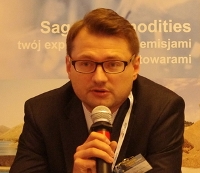 Jan Drabowicz from Grupa Lotos reported that the direct costs of the emission rights are not big enough to have a significant impact on the price of Lotos’ products. However it is important to remember, that EU ETS has also indirect effect on costs, like the price of electricity, of which Grupa Lotos SA is a big consumer. Drabowicz points out that no one had yet seen the exact price of emission rights in the future and no one is able now to predict them. At the beginning of operation of the system, no one expected the price of allowances to drop to such a low level, in turn, now hardly anyone expects that prices will rise over a certain threshold.
Jan Drabowicz from Grupa Lotos reported that the direct costs of the emission rights are not big enough to have a significant impact on the price of Lotos’ products. However it is important to remember, that EU ETS has also indirect effect on costs, like the price of electricity, of which Grupa Lotos SA is a big consumer. Drabowicz points out that no one had yet seen the exact price of emission rights in the future and no one is able now to predict them. At the beginning of operation of the system, no one expected the price of allowances to drop to such a low level, in turn, now hardly anyone expects that prices will rise over a certain threshold.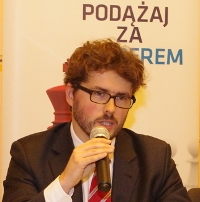 “In my opinion, the best solution would be to change the EU ETS to something else, something more effective "- said Jan Kłoczko, Portfolio Manager, Department of Energy Markets PGNiG TERMIKA. The expert also added that "the price will definitely go up in the medium term, because the market is expecting that. The problem is long term. PGNiG Termika SA a few days ago decided to build a gas cogeneration plant, which from economical perspective is not viable. It pays to thanks to the EU ETS, which is an artificial and political system, and thanks to the support system of energy production in cogeneration - yellow certificates, which are also is an artificial and political system ". According to the PGNiG Termika representative, in the long run we will get used to the unpredictability, as Germany did - which already closed many plants. But should building of energy sources look like this? - asked Kłoczko rhetorically.
“In my opinion, the best solution would be to change the EU ETS to something else, something more effective "- said Jan Kłoczko, Portfolio Manager, Department of Energy Markets PGNiG TERMIKA. The expert also added that "the price will definitely go up in the medium term, because the market is expecting that. The problem is long term. PGNiG Termika SA a few days ago decided to build a gas cogeneration plant, which from economical perspective is not viable. It pays to thanks to the EU ETS, which is an artificial and political system, and thanks to the support system of energy production in cogeneration - yellow certificates, which are also is an artificial and political system ". According to the PGNiG Termika representative, in the long run we will get used to the unpredictability, as Germany did - which already closed many plants. But should building of energy sources look like this? - asked Kłoczko rhetorically.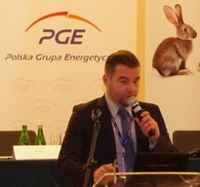 MSR will make the market become more complicated for the players and will make investment decisions more difficult. From the perspective of energy group the system seems to be too much governed politically and unnecessarily convoluted, however from the perspective of trading companies, banks and brokers it is a system that creates volatility that can be benefited from. However, the system was not created for the benefits of above mentioned entities. It was created in order to achieve the CO2 reduction targets - said Michał Mazurkiewicz, Deputy Director of the Department of the Treasury, PGE Polska Grupa energetyczna.
MSR will make the market become more complicated for the players and will make investment decisions more difficult. From the perspective of energy group the system seems to be too much governed politically and unnecessarily convoluted, however from the perspective of trading companies, banks and brokers it is a system that creates volatility that can be benefited from. However, the system was not created for the benefits of above mentioned entities. It was created in order to achieve the CO2 reduction targets - said Michał Mazurkiewicz, Deputy Director of the Department of the Treasury, PGE Polska Grupa energetyczna.Sarah Deblock believes that MSR is a fundamental change that should not be combined with political intervention, which was back-loading. The Commission representative added that the MSR may help to prevent another round of back-loading. The representative of the European Commission reminds that there are also non-European systems, where flexible mechanisms based on price and auctions tend to be canceled or moved, in a similar manner. No one can predict the exact prices, because they are shaped by the market. Analysts predict the price and give us a general idea of how they should look and therefore we can predict them more or less.
Zaremba accepted the fact that EU leaders agreed to a 80% reduction in emissions by 2050 as the group effort taken by industrialized countries. We assume that 80% will be achieve if global agreement will come to life. There is no global agreement as of yet, but we received suggestion to act as if there was one. The consequence of this is carbon leakage. If we want to be ambitious about our goal in emissions reduction, we need to protect the industry to avoid carbon leakage outside of EU.
Mazurkiewicz reminds us that PGE emits about 60 million tonnes of CO2 per year. The upcoming MiFID II directive poses a risk to the current system in the EU ETS, as is the fact that the allowances are becoming a financial instrument (in Polish law currently are not treated as a financial instrument by entities other than financial institutions), which will force companies which have operated unlicensed services (bought and sold powers mediating in the market) to become licensed. The existing system of intermediary companies will have to be remodeled. The Directive provides for some exceptions, from MiFID II for the companies, which deal with the buying of CO2 exclusively for the purpose of balancing its own emissions (for SPOT and futures with physical delivery).
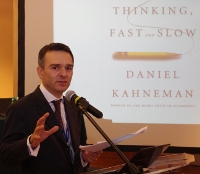 James Atkins, Chairman of Vertis Environmental Finance signaled that we are afraid of losses. Atkins advises that people on the one hand ask "how do you think they in which direction prices will go" and at the same time say "we cannot speculate, we must not." Two conflicting approaches cannot coexist in a well-developed trading plan. Significant phenomenon affecting trade in CO2 is also called anchoring - attaching importance to the numbers that affect our thinking. Although today's price is 6 EUR, in most minds the anchored price is 30 EUR reached in August 2006. This price is quite firmly anchored in the minds of investors and people making policies, so they think that the price will certainly increase. It was eight years ago - now the technology is different, the economy is different, so it seems unwise to be "forecasting" an increase in prices on the basis of association with the price of 30 EUR. CEO of Vertis urged us not to try to be smarter than the market, because we are not. Atkins delivered his speech on the book "Thinking fast and slow" by Daniel Kahneman.
James Atkins, Chairman of Vertis Environmental Finance signaled that we are afraid of losses. Atkins advises that people on the one hand ask "how do you think they in which direction prices will go" and at the same time say "we cannot speculate, we must not." Two conflicting approaches cannot coexist in a well-developed trading plan. Significant phenomenon affecting trade in CO2 is also called anchoring - attaching importance to the numbers that affect our thinking. Although today's price is 6 EUR, in most minds the anchored price is 30 EUR reached in August 2006. This price is quite firmly anchored in the minds of investors and people making policies, so they think that the price will certainly increase. It was eight years ago - now the technology is different, the economy is different, so it seems unwise to be "forecasting" an increase in prices on the basis of association with the price of 30 EUR. CEO of Vertis urged us not to try to be smarter than the market, because we are not. Atkins delivered his speech on the book "Thinking fast and slow" by Daniel Kahneman.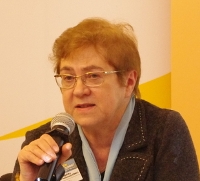 The afternoon part of the event was dominated by issues relating to carbon leakage and emission reduction trends with regard to transport, particularly air and road, as well as sectors not yet covered by the EU ETS. Magdalena Rogulska, Chief Specialist in Renewable Energy, Department of Renewable Energy Resources, Automotive Industry Institute (PIMOT) drew attention to the fact that in the face of systematic increase in emissions in transportation, the most important seems to be an increase in the use of biofuels. The expert drew attention to the work of the European Commission, which aim to reduce CO2, in particular on the guidelines of the Directive on the fuel quality and renewable energy sources. Rogulska also emphasized the requirements of vehicle manufacturers. Although the are many EU ETS ideas and policies, only their proper implementation is the key to success. Will complicated administrative work be worth the effort and will produce the expected results? According to the PIMOT representative it is important to first ensure that EU ETS works properly, before new sectors of economy are incorporated in it.
The afternoon part of the event was dominated by issues relating to carbon leakage and emission reduction trends with regard to transport, particularly air and road, as well as sectors not yet covered by the EU ETS. Magdalena Rogulska, Chief Specialist in Renewable Energy, Department of Renewable Energy Resources, Automotive Industry Institute (PIMOT) drew attention to the fact that in the face of systematic increase in emissions in transportation, the most important seems to be an increase in the use of biofuels. The expert drew attention to the work of the European Commission, which aim to reduce CO2, in particular on the guidelines of the Directive on the fuel quality and renewable energy sources. Rogulska also emphasized the requirements of vehicle manufacturers. Although the are many EU ETS ideas and policies, only their proper implementation is the key to success. Will complicated administrative work be worth the effort and will produce the expected results? According to the PIMOT representative it is important to first ensure that EU ETS works properly, before new sectors of economy are incorporated in it.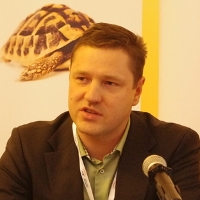 Alvis Septe, Head of Business Administration and Development, Smartlynx Airlines, stwierdził, że obecny poziom cen uprawnień do emisji CO2 nie jest dużym obciążeniem finansowym. Redukcja emisji odbywa się wskutek redukcji zużycia paliwa, którego zużycie jest kluczowym kosztem dla sektora lotniczego. Nie ma wątpliwości, że jedyną słuszną drogą jest inwestowanie w efektywniejsze technologie, w szczególności te, które redukują konsumpcję paliw. Septe uważa, że lotnictwo nie jest przeciwne systemowi, jednakże jest wiele niejasności, którym ten sektor musi stawiać czoła. Reprezentant Smartlynx stwierdził ponadto, że głównym problemem EU ETS jest nieprzewidywalność oraz brak pewności, czy działanie systemu przekłada się na redukcję CO2? Czy mechanizm ETS osiąga zamierzony cel? Nie ma na to jednoznacznej odpowiedzi. Mimo braku odpowiedzi na te pytania, Spete uważa, że warto rozszerzyć system na inne sektory.
Alvis Septe, Head of Business Administration and Development, Smartlynx Airlines, stwierdził, że obecny poziom cen uprawnień do emisji CO2 nie jest dużym obciążeniem finansowym. Redukcja emisji odbywa się wskutek redukcji zużycia paliwa, którego zużycie jest kluczowym kosztem dla sektora lotniczego. Nie ma wątpliwości, że jedyną słuszną drogą jest inwestowanie w efektywniejsze technologie, w szczególności te, które redukują konsumpcję paliw. Septe uważa, że lotnictwo nie jest przeciwne systemowi, jednakże jest wiele niejasności, którym ten sektor musi stawiać czoła. Reprezentant Smartlynx stwierdził ponadto, że głównym problemem EU ETS jest nieprzewidywalność oraz brak pewności, czy działanie systemu przekłada się na redukcję CO2? Czy mechanizm ETS osiąga zamierzony cel? Nie ma na to jednoznacznej odpowiedzi. Mimo braku odpowiedzi na te pytania, Spete uważa, że warto rozszerzyć system na inne sektory.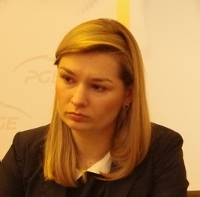 Katarzyna Kłaczyńska, Head of Energy Legal Practise at EY Law, pointed to regulatory gaps in the EU ETS and the problems arising from the fact that this system is determined from many legal levels. Although the emissions trading scheme is very advanced and ambitious, it still needs to be approached critically. You should not be hidden, that EU ETS is very complicated, and some regulations are simply unclear. EY Law Firm representative stressed that there is currently competition between Member States. While there is the possibility of reimbursing sectors at risk of carbon leakage, for a long time now only the richer countries protect and implement such programs (eg. The United Kingdom, Norway, the Netherlands, Belgium). On the one hand reduction programs are regulated by the European Union, on the other, the actual cost is determined by the will of the country concerned. At the moment Kłaczyńska is in favor of extending the system to other sectors, according to the expert, it would be better to focus on possible solutions to the present problems.
Katarzyna Kłaczyńska, Head of Energy Legal Practise at EY Law, pointed to regulatory gaps in the EU ETS and the problems arising from the fact that this system is determined from many legal levels. Although the emissions trading scheme is very advanced and ambitious, it still needs to be approached critically. You should not be hidden, that EU ETS is very complicated, and some regulations are simply unclear. EY Law Firm representative stressed that there is currently competition between Member States. While there is the possibility of reimbursing sectors at risk of carbon leakage, for a long time now only the richer countries protect and implement such programs (eg. The United Kingdom, Norway, the Netherlands, Belgium). On the one hand reduction programs are regulated by the European Union, on the other, the actual cost is determined by the will of the country concerned. At the moment Kłaczyńska is in favor of extending the system to other sectors, according to the expert, it would be better to focus on possible solutions to the present problems.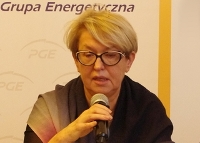 The 100% of the members of Lewiatan Confederation consume energy, and many of them are in the energy intensive businesses. Daria Kulczycka, Director of the Department of Energy and Climate Change in the Confederation announced that there was created a special fund for the modernization of the energy sector, which aims to contribute to the modernization of the Polish heavy industry. The expert also mentioned that the policy should be revised after the next climate summit. If the authorities fail to reach a compromise that will be acceptable to European business, the terms will have to be renegotiated. We should protect the sector and the use of surplus emission permits in the future. The system should be prepared ex-ante rather than ante post.
The 100% of the members of Lewiatan Confederation consume energy, and many of them are in the energy intensive businesses. Daria Kulczycka, Director of the Department of Energy and Climate Change in the Confederation announced that there was created a special fund for the modernization of the energy sector, which aims to contribute to the modernization of the Polish heavy industry. The expert also mentioned that the policy should be revised after the next climate summit. If the authorities fail to reach a compromise that will be acceptable to European business, the terms will have to be renegotiated. We should protect the sector and the use of surplus emission permits in the future. The system should be prepared ex-ante rather than ante post.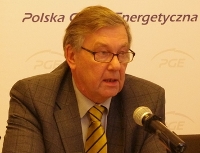 Andrzej Rode, Member of the Board of Air Transport Support, said that the aviation sector is the only sector that have already years ago, voluntarily imposed on itself voluntary targets for the reduction of CO2 - 1.5% annual increase in efficiency until 2020. In aviation, fuel makes up more than 30% of basic costs. Saving fuel in aviation is essential. EU ETS does not effect on the perception of the cost of from the aviation perspective. Since the EU ETS was implemented quickly and in a manner that was somewhat chaotic, it did not create incentives to enable the transition to biofuels. There are airlines already using biofuels, however, the cost of biofuels is incomparably higher. Aviation needs a more effective sector strategy, incentives and mechanisms that would allow for the transition to biofuels.
Andrzej Rode, Member of the Board of Air Transport Support, said that the aviation sector is the only sector that have already years ago, voluntarily imposed on itself voluntary targets for the reduction of CO2 - 1.5% annual increase in efficiency until 2020. In aviation, fuel makes up more than 30% of basic costs. Saving fuel in aviation is essential. EU ETS does not effect on the perception of the cost of from the aviation perspective. Since the EU ETS was implemented quickly and in a manner that was somewhat chaotic, it did not create incentives to enable the transition to biofuels. There are airlines already using biofuels, however, the cost of biofuels is incomparably higher. Aviation needs a more effective sector strategy, incentives and mechanisms that would allow for the transition to biofuels.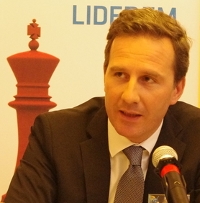 Julien Dufour, CEO, VERIFAVIA, recalled that the Directive has included the aviation sector into the system in a chaotic manner. Particularly controversial was the way the system should treat non-European airlines that have flights to Europe. At the current price the cost of emissions in the aviation sector ranks at the level of 1% of the cost (due to the fact that 70% of emissions in the aviation sector are free). Dufour, similarly to the previous speaker pointed out that the biggest problem for the sector are fuel costs, which will force emission reduction, not EU ETS.
Julien Dufour, CEO, VERIFAVIA, recalled that the Directive has included the aviation sector into the system in a chaotic manner. Particularly controversial was the way the system should treat non-European airlines that have flights to Europe. At the current price the cost of emissions in the aviation sector ranks at the level of 1% of the cost (due to the fact that 70% of emissions in the aviation sector are free). Dufour, similarly to the previous speaker pointed out that the biggest problem for the sector are fuel costs, which will force emission reduction, not EU ETS.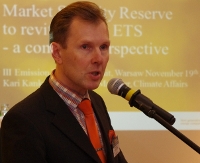 Kari Kankaanpää, a member of the working group in Eurelectric climate section and Senior Manager, Climate Affairs at Fortum said that in order to reduce emissions in the energy sector there can be applied a different mechanisms like: taxation, standards of operation, restrictions on fuels and economic instruments such as grants, programs of trade and loan programs / credit. By adjusting this instruments to a particular criterion, it should be considered whether we are achieving the goal of reducing emissions. In Fortum's environmental activities are also assessed in terms of transparency and competition on the market.
Kari Kankaanpää, a member of the working group in Eurelectric climate section and Senior Manager, Climate Affairs at Fortum said that in order to reduce emissions in the energy sector there can be applied a different mechanisms like: taxation, standards of operation, restrictions on fuels and economic instruments such as grants, programs of trade and loan programs / credit. By adjusting this instruments to a particular criterion, it should be considered whether we are achieving the goal of reducing emissions. In Fortum's environmental activities are also assessed in terms of transparency and competition on the market.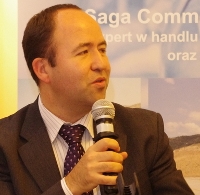 Francisco Grajales Cravioto, Regional Manager for Global Emissions at Vattenfall Energy Trading said that the world is moving in a direction where the greenhouse gas emissions must be controlled. In the face of ongoing progress, does doing nothing can be the right alternative? Vattenfall has a pro-active approach to reducing emissions and turns in a constructive dialogue with decision-makers, through scientific analysis and research. According to the expert ETS is the right system for reducing greenhouse gases. Of course the mechanism is new, so it could not do without mistakes, but that does not mean that the concept is bad. According to the expert the planned MSR is going in the right direction.
Francisco Grajales Cravioto, Regional Manager for Global Emissions at Vattenfall Energy Trading said that the world is moving in a direction where the greenhouse gas emissions must be controlled. In the face of ongoing progress, does doing nothing can be the right alternative? Vattenfall has a pro-active approach to reducing emissions and turns in a constructive dialogue with decision-makers, through scientific analysis and research. According to the expert ETS is the right system for reducing greenhouse gases. Of course the mechanism is new, so it could not do without mistakes, but that does not mean that the concept is bad. According to the expert the planned MSR is going in the right direction.James Atkins believes that the ETS mechanism is an imperfect system, always will be like that and we better get used to that. We are talking about a system that will manage the economy of 500 million people, if you expect a simple system that will be fair for so many people, such expectation is unreasonable. It can be considered that the ETS mechanism is relatively simple in comparison with such mechanisms as the decoding of the human genome, the treatment of leukemia or weather forecasting.
We do not know yet whether the ETS will work properly or not, because we measure the wrong thing - emissions at their source, and should rather be measuring emissions based on consumption or demand. Atkins fears that the price will never be high enough to be effective. Price would have to hurt industries to be effective, but then lobbyists will try to reduce it. All mechanisms regardless of whether they are taxes, trade programs, control etc. lead to the fact that good and effective mechanisms are more expensive. According to Atkins, we should lead to a situation in which people will want a more expensive and effective mechanisms instead of cheaper and less effective.
Author: Kamil Szkup
Article has been prepared on the basis of lectures and materials from the 3rd edition of the international conference "Emission Trading Summit", which took place on 19 November 2014. It was organized by CBE Polska. The general partner of the event was the PGE Polska.
We would also like to thank the following companies for their commitment: Vertis Environmental Finance, which was the Strategic Partner; EY Law, which was the Business Partner and the company Saga Commodities, which presented at the Exhibition stand.
The Honorary Patronage over the event was taken by the Ministry of Environment, Ministry of Economy, the National Fund for Environmental Protection and Water Management, Polish Chamber of Chemical Industry, Climate Coalition, Lewiatan Confederation, Institute for Sustainable Development, Association of Employers Renewable Energy Forum, the Association of Wood Based Panels Producers Association of Brokers and Advisors and The Climate Markets and Investment Association.
Simultaneous translation of the event was provide by company Bireta.
We thank all participants and partners involved in the event and patrons. We encourage you to ask additional questions regarding specific instances, to share with us proposals and to participate in subsequent events organized by us.



































































































































We would also like to thank the following companies for their commitment: Vertis Environmental Finance, which was the Strategic Partner; EY Law, which was the Business Partner and the company Saga Commodities, which presented at the Exhibition stand.
The Honorary Patronage over the event was taken by the Ministry of Environment, Ministry of Economy, the National Fund for Environmental Protection and Water Management, Polish Chamber of Chemical Industry, Climate Coalition, Lewiatan Confederation, Institute for Sustainable Development, Association of Employers Renewable Energy Forum, the Association of Wood Based Panels Producers Association of Brokers and Advisors and The Climate Markets and Investment Association.
Simultaneous translation of the event was provide by company Bireta.
We thank all participants and partners involved in the event and patrons. We encourage you to ask additional questions regarding specific instances, to share with us proposals and to participate in subsequent events organized by us.


























































































































































 Stowarzyszenie Producentów Płyt Drewnopochodnych
Stowarzyszenie Producentów Płyt Drewnopochodnych







